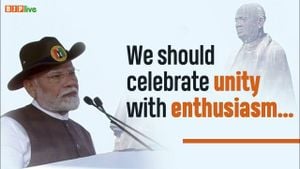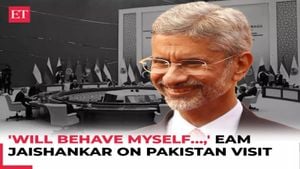India is on the brink of significant legal reform, pushing toward the establishment of a Uniform Civil Code (UCC) as part of the government’s broader agenda for national unity and integration. Prime Minister Narendra Modi, during the recent Rashtriya Ekta Diwas (National Unity Day) celebrations, articulated this vision, celebrating the birth anniversary of Sardar Vallabhbhai Patel, India’s first Home Minister and a key figure in the country's unification. The setting for Modi's announcement was symbolic, taking place near the iconic Statue of Unity located in Gujarat's Narmada district, highlighting his call for unity amid diverse cultural backgrounds.
“Today, India is moving toward One Nation, One Civil Code, which is, above all, a Secular Civil Code,” Modi pronounced, asserting it would bolster the nation. This initiative aims to standardize laws concerning marriage, inheritance, and divorce across all religions, potentially simplifying and unifying legal processes currently governed by diverse personal laws applicable to various religious communities.
Modi underscored the success of various previous nationwide reforms, like the biometric system of Aadhar, the Goods and Services Tax (GST), and the One Nation One Ration Card scheme, as stepping stones leading to this ambitious move. He pointed out, “Earlier, there were different tax systems, but we created the One Nation, One Tax system—GST, which has bolstered economic transparency and simplified administration,” reflecting the Modi government’s approach to governance through standardization.
Critically, the Prime Minister also connected this reform with another significant initiative—the One Nation One Election proposal, which aims to synchronize polling dates across India to boost electoral efficiency. He stated, “Under these efforts for unity, we are now working toward One Nation One Election, which will strengthen India’s democracy,” emphasizing the goal of optimal resource use.
Modi’s address also contained strong words about perceived threats to national unity. He claimed external and internal forces are working to destabilize the country, sowing discord and attempting to project India negatively on international platforms. The Prime Minister cautioned citizens against the emergence of “urban Naxals,” stating, “Some forces within and outside India are trying to divide the country on caste lines and are against developed India.” This reflects Modi’s inclination to confront and challenge dissenters he perceives as threats to national stability.
While Modi's call for the UCC is steeped in aspirations for equality and unity, it is also deeply controversial. Opposition parties have voiced concerns over the ultimate goal of UCC implementation and whether it can be executed without widespread consensus among India’s various religious communities. For many, the question remains whether this legal framework can effectively balance the nation's secular identity with the diverse cultural practices prevalent among its citizens.
On the ground, smaller states like Uttarakhand have made strides toward implementing UCC, which showcases how regional politics may respond to Modi's broader national discourse. The Chief Minister of Uttarakhand acknowledged the challenges and the need for universal acceptance. Meanwhile, Modi remains adamant about the necessity of each citizen embracing the UCC as it aligns with the Narendra Modi government's vision of integrating governance fine-tuned for all.
Modi also took time to commemorate Sardar Patel’s legacy, who famously united India post-independence, drawing parallels between Patel’s political acumen and the current government’s resolve to solidify national unity. “For the first time in 70 years, the chief minister of Jammu and Kashmir has taken oath on the Constitution,” Modi highlighted, celebrating recent political transitions as indicators of progress toward unity.
Despite applauding the reforms and initiatives, political opponents stress the potential risks the UCC poses to the pluralistic nature of India. This celebratory assertion from Modi may kindle debates on secularism and the identity of citizenship within the country's diverse religious pluralism.
All these developments provide fertile ground for discussions about legal identity and the place of various religious laws versus uniformity under state law. The pursuit of the UCC, though viewed as progressive by some, raises pertinent questions on how far the narrative of 'unity' extends when entwined with 'uniformity'. The complex fabric of Indian society has been known to interact intricately, and any move toward UCC will require careful navigation through the nuanced layers of inter-community relations.
Looking forward, Modi's agenda seems poised to draw significant scrutiny. Advocates argue for human rights and gender equality, highlighting the need for uniform laws to protect vulnerable groups across various communities, paving the way for laws like marital rights and inheritance, which have historically been marred by inconsistency and gender bias.
Meanwhile, critics urge caution, insisting any move to implement UCC must involve widespread consultation and must not infringe upon the cultural and religious freedoms acknowledged by India’s Constitution. The impending discussions around UCC promise to spotlight the evolution of India's legal framework, where the intersection of tradition and modern governance continues to shape the nation's future.
Through it all, the government’s narrative remains clear: as they push for modernization and integration, the rhetoric surrounding the establishment of the UCC feeds directly from the government’s broader theme of national unity. With opposition mounting on several fronts, how India negotiates this delicate balance remains to be seen, marking it as one of the most consequential discussions of modern Indian politics.



